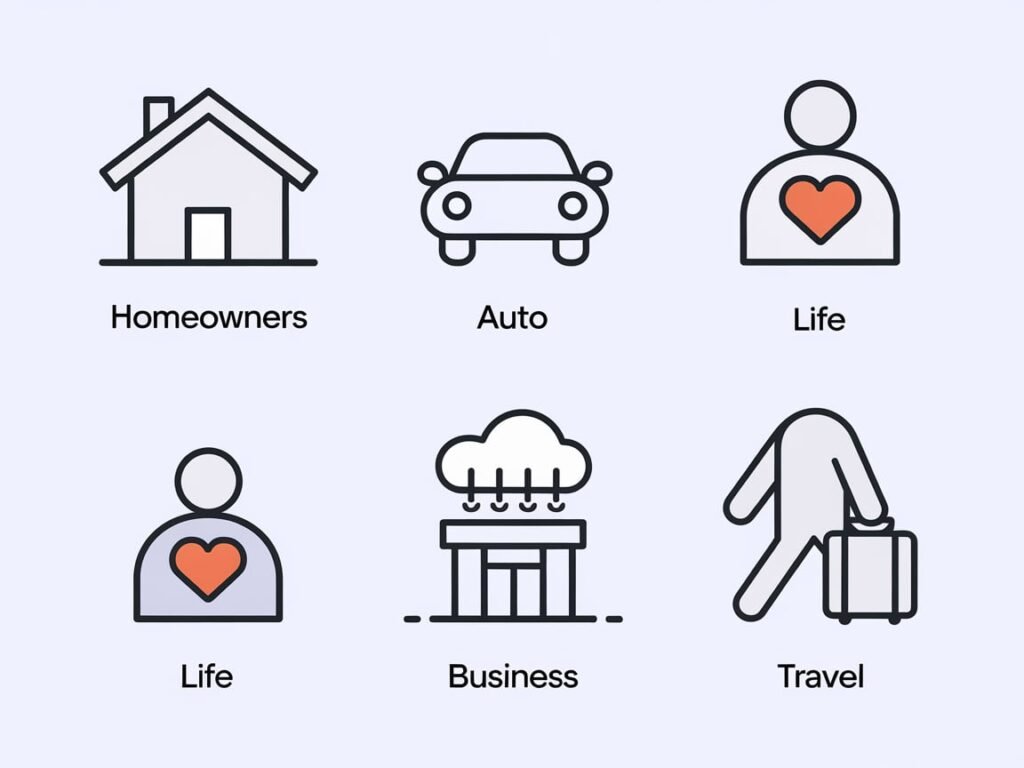Meta Description:
Discover the 5 essential types of coverage to protect your finances. Learn how to choose the right health, life, auto, homeowners, and disability protection for your needs.
5 Essential Types of Coverage and How to Choose the Right Protection

Coverage options are an important aspect of financial planning, but they are often misunderstood. Whether you’re just starting out or planning for retirement, choosing the right protection can safeguard your financial stability and help you navigate unexpected life events. This guide will explain the key types of coverage, why they matter, and how to choose the best options for your needs.
What Is Coverage and Why Is It Important?
At its core, coverage refers to the protection you receive from a provider in exchange for regular premium payments. This financial protection helps you manage unexpected costs, such as medical bills, vehicle repairs, or property damage. Having the right coverage ensures that you’re not financially overwhelmed when emergencies arise.
1. Health Protection: Safeguarding Your Well-Being

Health coverage is vital for protecting you from the high costs of medical care. Without it, hospital visits, medications, and surgeries can lead to financial strain. Health plans typically cover a wide range of services, including doctor’s visits, hospital care, prescription medications, and preventive treatments.
Choosing the Right Health Plan: When evaluating your health plan options, consider:
- Premiums: What you pay monthly for coverage.
- Deductibles: The amount you pay out-of-pocket before your plan begins to pay.
- Network: Check if your preferred providers are covered.
- Coverage Details: Understand what’s included, such as preventive care and emergency services.
Tip: If your employer offers health plans, compare them to independent providers to find the best deal.
2. Life Protection: Ensuring Financial Security for Your Family

Life coverage is crucial if you have dependents or loved ones who rely on your income. This protection ensures your family receives a financial payout in the event of your passing. There are two main types: term life and whole life.
- Term Life offers coverage for a specific period (e.g., 20 years), with a death benefit paid if you pass away during that term.
- Whole Life provides lifelong coverage and also builds cash value over time.
How to Select Life Protection: When considering life coverage, think about:
- The amount of the death benefit your family needs.
- Your current health and age, as this affects premium rates.
- Your financial goals—term life is typically more affordable, while whole life can offer lifelong coverage.
Tip: For families with dependents, term life insurance may offer the most cost-effective protection.
3. Auto Protection: Securing Your Vehicle and Liability
Auto protection is legally required in most states and is essential for covering costs related to car accidents, vehicle damage, and liability. Auto plans can cover repairs, medical bills, and other expenses resulting from an accident.
Key Auto Protection Options:
- Liability Coverage: Covers damage to others’ property or medical costs if you’re at fault.
- Collision Coverage: Pays for your car’s repair costs after an accident.
- Comprehensive Coverage: Protects against non-collision damages like theft or weather-related incidents.
- Uninsured Motorist Protection: Provides coverage if you’re in an accident with someone who doesn’t have sufficient protection.
Choosing Auto Coverage: When deciding on auto protection, consider:
- State requirements for coverage.
- The value of your vehicle.
- Your driving history and its impact on premiums.
Tip: Compare quotes from various providers to ensure you’re getting the best price for your needs.
4. Home Protection: Defending Your Property and Assets
Homeowners protection is designed to protect your home and possessions from damage caused by events like fires, storms, or theft. It also offers liability protection in case of accidents on your property.
How to Select Home Protection: When evaluating homeowners plans, keep the following in mind:
- Coverage Limits: Ensure the policy covers the full replacement value of your property and belongings.
- Deductibles: Understand the amount you must pay before coverage begins.
- Exclusions: Make sure to review what’s excluded from coverage, such as floods or earthquakes.
Tip: If you live in a high-risk area, like a flood zone, consider additional coverage options beyond the standard homeowners plan.
5. Disability Protection: Securing Your Income if You Can’t Work
Disability coverage replaces a portion of your income if an illness or injury prevents you from working. This often-overlooked protection is crucial for maintaining financial stability in case of temporary or long-term disability.
How to Choose Disability Protection: Consider these factors when evaluating disability plans:
- Short-Term vs. Long-Term: Short-term disability covers a shorter period, while long-term covers a more extended time frame.
- Benefit Amount: Ensure the coverage replaces a sufficient portion of your income (typically 50-70%).
- Waiting Period: Understand the time before benefits start.
Tip: Many employers provide group disability protection, which can be more affordable than purchasing individual plans.nefit, which can be more affordable than purchasing individual coverage.
FAQs:
1. Why do I need insurance?
Insurance provides financial protection from unexpected events, ensuring you won’t face financial hardship due to accidents, illness, or damage to your property.
2. What type of life insurance should I get?
If you’re looking for affordable coverage to protect your family, term life insurance is a great option. For lifelong coverage and the ability to build cash value, consider whole life insurance.
3. How do I choose the right health insurance?
Consider your healthcare needs, the premiums you can afford, and the coverage options available to you. Compare different health plans to find the best fit.
4. Is auto insurance mandatory?
Yes, in most states, auto insurance is required by law. The minimum required coverage varies by state, but it’s essential to have liability coverage and consider additional protection like collision or comprehensive insurance.
5. How can I save on homeowners insurance?
Shop around for quotes, maintain a good credit score, and bundle your homeowners insurance with other policies (like auto insurance) for discounts.
External Resources:
- National Association of Insurance Commissioners (NAIC) – Insurance Basics
- Insurance Information Institute – Types of Insurance
- Consumer Reports – Insurance Buying Guide
- HealthCare.gov – Health Insurance Coverage Options
- Investopedia – Life Insurance Types
Insurance is an essential tool in protecting your financial future. By understanding the different types of insurance and choosing the right coverage, you can ensure that you and your loved ones are financially secure in case of unexpected events.


